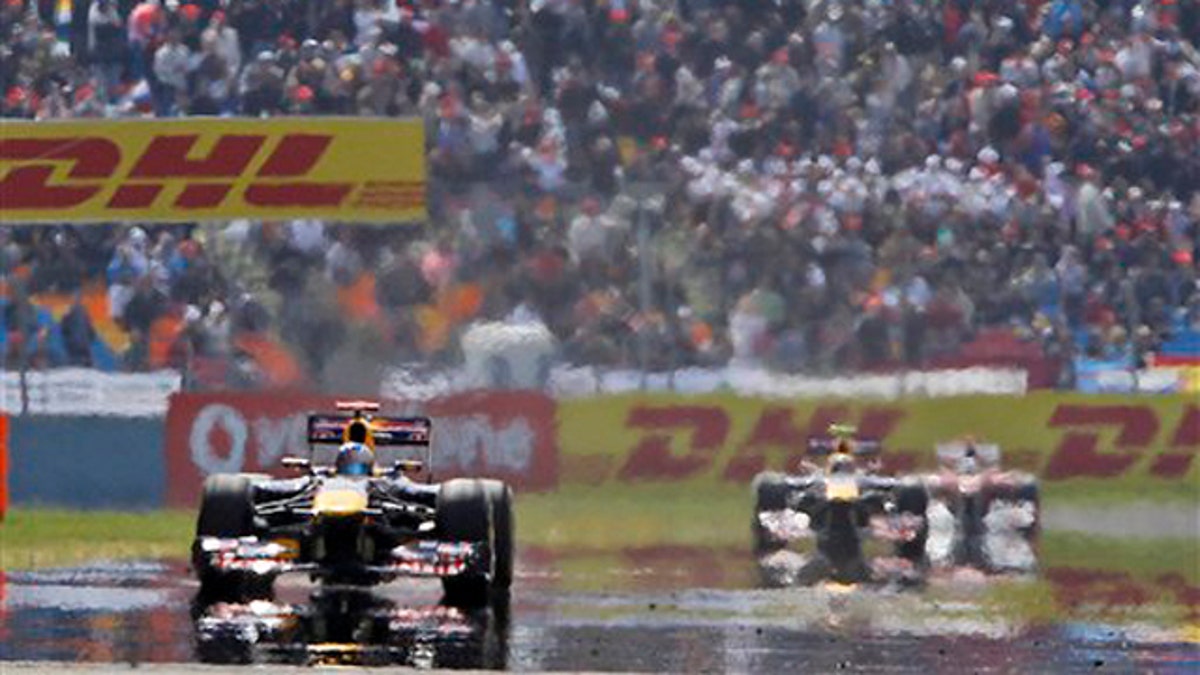
Drivers race during the Formula One Grand Prix at the Istanbul Park circuit racetrack in Istanbul, Turkey, May 8. (AP)
As Texas grapples with a gaping budget deficit, the state is moving forward with a plan to subsidize Formula One racing to the tune of $250 million over the next decade.
An agreement was struck last year to bring Formula One to Austin starting in 2012, but the public financing component is drawing fresh criticism as lawmakers try to figure out how to close a budget shortfall estimated to be as high as $27 billion over the next two years. They've proposed steep cuts, including to education, and some question whether the racing money could be put to better use preventing teacher layoffs.
"The money would be better spent on the schools," said Clay Robison, with the Texas State Teachers Association, adding that tax dollars should not be going toward private enterprise. "I'm a baseball fan, and I would be opposed to them spending money on a new baseball stadium."
State Sen. Dan Patrick, a conservative Republican from Houston, recently spearheaded a vote against the funding in the finance committee. "This is not something we should be doing. How can you justify spending $25 million? That is 500 teachers," he said.
Patrick said the vote against the money "slowed down" the process, but acknowledged it might not block the funding. The House and Senate are still trying to reconcile the differences between their budgets, and the Texas office responsible for the Formula One funding expressed confidence it would survive.
"It's still there. It's not been stripped," Allen Spelce, spokesman for state Comptroller Susan Combs, told FoxNews.com. "It's still moving along in the budget process."
State officials are defending the Formula One arrangement, arguing it will be such a money-maker for Texas that the state will easily recoup its investment.
Planners have cited some ambitious projections, estimating that the Formula One race in Austin will generate about $300 million in economic activity annually. Spelce said the state would put up $25 million at the outset, and then use the presumed windfall of sales tax generated by the event to reinvest that amount year after year for the next decade.
"It's revenue-neutral. ... What we're doing is we're front-ending the $25 million," Spelce told FoxNews.com. "It could potentially even bring in more money."
The money, intended to help pay for the cost of everything from security to portable bathrooms, would come from Texas' "major events trust fund" and go directly to Formula One. Spelce stressed that Formula One charges this kind of fee in other locations and stressed that it was a critical part of the deal to locate the race in Austin.
Asked why the state didn't turn to private investors to put up the money instead, and then keep the extra sales tax revenue for itself, Spelce said Texas' events fund was set up for exactly this kind of purpose -- to attract "large, competitively placed events." The fund has been used in the past to lure events like the Super Bowl and NCAA championships.
The construction of the Circuit of the Americas track -- a 3.4-mile course with seating for 120,000 which will host the Formula One race and other events -- is being financed separately by a group of private investors, not by the state.
But Robison questioned why private sources couldn't also finance the race itself.
"If it's that good a deal, then they should have found some more private investors," he said.
Robison estimates that budgets being hammered out in the Texas Legislature could cost the state tens of thousands of school district jobs, and said state priorities should be education and health care.
Richard Viktorin, with the Texas advocacy group Audits in the Public Interest, also testified before a state Senate committee earlier this year saying the economic activity estimates were wildly inflated. He called the deal a "liar's loan" and suggested the event would not draw the money or the crowds anticipated.
"Formula One's numbers as to economic activity created are outrageously overstated," he said.
Formula One, a Europe-based racing series, does not have anywhere close to the kind of devoted following in the United States enjoyed by NASCAR. Formula One races are held all over the world, in high-end locations like Monaco and Singapore. Their races have been hosted by several American cities over the last few decades, most recently in Indianapolis, but Formula One in the U.S. went on hiatus in 2007.
With the race returning, planners hope to continue drawing an international crowd. Even if NASCAR fans are reluctant to experiment with the Grand Prix in Austin, Circuit of the Americas spokeswoman Ali Putnam said organizers anticipate crowds from Latin America and Europe will attend.
"Mexico considers this ... as their home race," she said, adding that the only other races in the Americas are in Montreal and Brazil. "This is huge for Mexico."
And Austin is close to other major cities in Texas, like San Antonio, Houston and Dallas.
Putnam expressed confidence that the race would draw a big crowd, and she noted that the track, once completed, will host other events throughout the year, generating more revenue for the state.
She said the $25 million state payment was important for Formula One, not for the private investors who are financing the construction of the track itself.
Spelce said that while "everything's on the table" in the Texas budget talks, it doesn't appear the Formula One money is threatened.
Lucy Nashed, spokeswoman for Gov. Rick Perry, said the governor is "thankful" for the work of the comptroller in securing the Grand Prix in Austin. She, too, said the trust fund was created for this kind of event.
"We're always looking for opportunities here to grow our economy and create jobs," Nashed said.












































